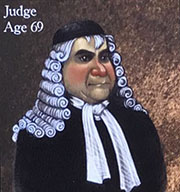
After a few young girls began to have fits blamed on the devil, the town of Salem was quickly engulfed in tryals (note the olde spelling) and "confessions" of Witchcraft.
Once all was said and done, more than 150 people were accused of witchcraft. 19 people were hanged as witches, 1 was pressed to death, and at least 5 of the accused died in prison.
-

Abigail Williams - Child (11)
Abigail, the niece of Samuel Parris, was one of the first young girls to accuse others of witchcraft. She claimed to have epileptic fits and pinching pains inflicted upon her by witches. Two of the first people to be accused by Abigail were Sarah Good and Tituba.
-

Ann Putnam - School Girl (13)
Ann belonged to the powerful Putnam family and was one of the first accusers in the town. Some believe that her parents, Thomas and Ann, forced her to accuse people who they were feuding with. In 1706 Ann publicly apologized for her role in the Witch Trials.
-

Cotton Mather - Minister (29)
Cotton was one of the most prominent ministers in New England at the time of the Witch Trials. Many blame him for laying the groundwork of extremism, and for allowing "spectral evidence" to be used against defendants. Cotton went on to become an important author and scientist.
-

Giles Corey - Landowner (71)
Giles was accused of witchcraft along with his wife Martha Corey. Giles refused to confess or deny his guilt, and was therefore subjected to the punishment of pressing. Instead of speaking, Giles died after two days of being pressed by a large stone.
-

George Burroughs - Strongman (40)
George, a clergyman, was charged with witchcraft partially because his feats of strength (lifting a musket with a finger) were hard to justify without the devil's assistance. While being hanged, he recited the Lord's Prayer, something that was supposedly impossible for witches to do.
-

John Proctor - Farmer (60)
John was a man of high reputation. Originally, his wife Elizabeth was accused. John defended her and expressed disbelief in the girls' accusations. Because of this, Abigail Williams accused him of violence and forcing her to touch the Devil's Book. John was hanged in August 1692.
-

Martha Corey - Seamstress (72)
Martha, married to Giles, was a pious member of the church and was critically outspoken against the trials. In court, children mimicked her movements and claimed Martha was controlling them. Because of this, Martha was hanged in September 1692.
-

Mary Warren - Servant (17)
Mary was a servant to John and Elizabeth Proctor. She was one of the first in the town to accuse others of witchcraft, claiming to have seen visions of the ghost of Giles Corey. She was eventually arrested for practicing witchcraft herself, and confessed, but was never hanged.
-

Rebecca Nurse - Housewife (71)
Rebecca was one of the oldest, most respected people to be accused of witchcraft. 39 members of the community signed a petition for her release from prison. Rebecca was eventually hanged, and was known for having impressively dignified behavior on the gallows.
-

Samuel Parris - Pastor (39)
Samuel Parris was the main pastor in the town of Salem. Before the Witch Trials, he sought out "iniquitous behavior" in his congregation and made church members in good standing suffer. His attitude contributed to the suspicious, tense atmosphere in the town.
-

Sarah Good - Beggar (39)
Sarah was a homeless beggar, and was perhaps accused of witchcraft because of her poor reputation. Among other things she was accused of rejecting many of the "Puritan expectations" of the town. Sarah was hanged in July 1692.
-

Thomas Danforth - Judge (69)
Thomas was one of the judges during many of the trials that were held in Salem. Thomas disapproved of the trials, and may have had a hand in putting an end to them.
-

Tituba - Storyteller (35)
Tituba was a slave of Samuel Parris and the first person to be accused of witchcraft since she had enchanted the young girls of the town with mythical tales. Despite her confession, Tituba was never hanged and was eventually released from prison.
-

Will Griggs - Physician, (47)
Griggs was in charge of diagnosing witches, and determining how "big" of a witch someone was. After his diagnosis, he'd send his patients to be tried, where they were often found guilty, and executed.
-

William Phips - Governor (42)
Sir William Phips was a Boston shipbuilder before finding treasure in a sunken Spanish galleon. Phips used his money & connections to become the first royally-appointed Governor of the Massachusetts Bay. Phips established, and later disbanded the Salem Witches Court.
Continue Reading


